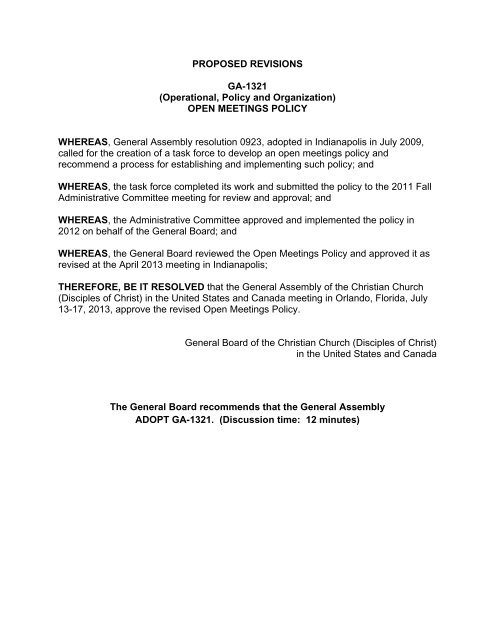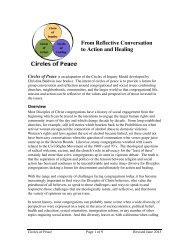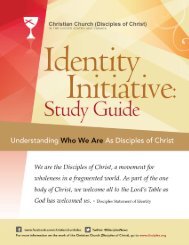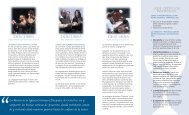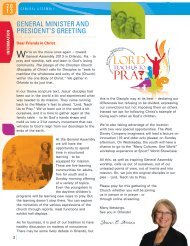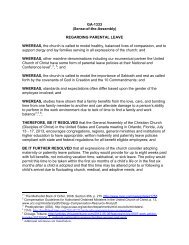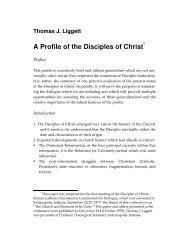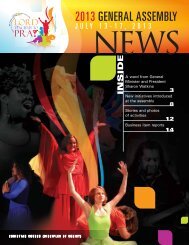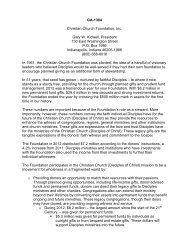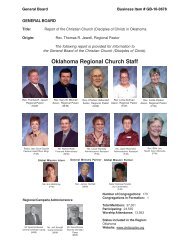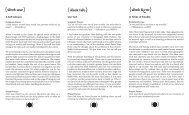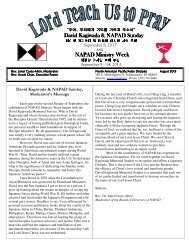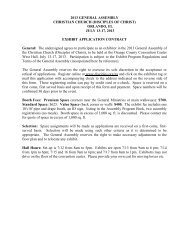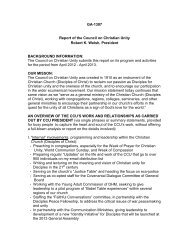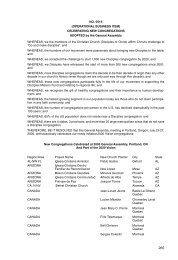Open Meetings Policy - Christian Church (Disciples of Christ)
Open Meetings Policy - Christian Church (Disciples of Christ)
Open Meetings Policy - Christian Church (Disciples of Christ)
Create successful ePaper yourself
Turn your PDF publications into a flip-book with our unique Google optimized e-Paper software.
PROPOSED REVISIONS<br />
GA-1321<br />
(Operational, <strong>Policy</strong> and Organization)<br />
OPEN MEETINGS POLICY<br />
WHEREAS, General Assembly resolution 0923, adopted in Indianapolis in July 2009,<br />
called for the creation <strong>of</strong> a task force to develop an open meetings policy and<br />
recommend a process for establishing and implementing such policy; and<br />
WHEREAS, the task force completed its work and submitted the policy to the 2011 Fall<br />
Administrative Committee meeting for review and approval; and<br />
WHEREAS, the Administrative Committee approved and implemented the policy in<br />
2012 on behalf <strong>of</strong> the General Board; and<br />
WHEREAS, the General Board reviewed the <strong>Open</strong> <strong>Meetings</strong> <strong>Policy</strong> and approved it as<br />
revised at the April 2013 meeting in Indianapolis;<br />
THEREFORE, BE IT RESOLVED that the General Assembly <strong>of</strong> the <strong><strong>Christ</strong>ian</strong> <strong>Church</strong><br />
(<strong>Disciples</strong> <strong>of</strong> <strong>Christ</strong>) in the United States and Canada meeting in Orlando, Florida, July<br />
13-17, 2013, approve the revised <strong>Open</strong> <strong>Meetings</strong> <strong>Policy</strong>.<br />
General Board <strong>of</strong> the <strong><strong>Christ</strong>ian</strong> <strong>Church</strong> (<strong>Disciples</strong> <strong>of</strong> <strong>Christ</strong>)<br />
in the United States and Canada<br />
The General Board recommends that the General Assembly<br />
ADOPT GA-1321. (Discussion time: 12 minutes)
<strong>Open</strong> <strong>Meetings</strong> <strong>Policy</strong><br />
(Revised April 2013)<br />
INTRODUCTION: The <strong>Open</strong> <strong>Meetings</strong> <strong>Policy</strong> is intended to further expressions <strong>of</strong> faith,<br />
reason, and trust, be essential to the flourishing <strong>of</strong> healthy communities <strong>of</strong> faith. While<br />
open meeting policies for churches follow some <strong>of</strong> the same principles as open meeting<br />
policies or “sunshine laws” in a secular democratic society, the ground for this policy is<br />
the spirit <strong>of</strong> openness exhibited by Jesus <strong>Christ</strong> and the desire to speak the truth in love<br />
among his believers to further the work <strong>of</strong> his church.<br />
APPLICATION: In the spirit <strong>of</strong> openness, accountability, trust, and unity, the following<br />
policy establishes the application <strong>of</strong> an <strong>Open</strong> <strong>Meetings</strong> <strong>Policy</strong> to as broad a<br />
representation <strong>of</strong> bodies in the church as possible; the criteria for Executive Sessions<br />
that allows for the appropriate conduct <strong>of</strong> certain types <strong>of</strong> business; and further aspects<br />
<strong>of</strong> implementation and notification.<br />
All meetings <strong>of</strong> bodies within the <strong><strong>Christ</strong>ian</strong> <strong>Church</strong> (<strong>Disciples</strong> <strong>of</strong> <strong>Christ</strong>) are encouraged<br />
to interpret this policy liberally, i.e., to function as openly as possible for as long as<br />
possible in the spirit <strong>of</strong> trust and transparency.<br />
Specifically, this <strong>Open</strong> <strong>Meetings</strong> <strong>Policy</strong> applies to:<br />
1. The General Assembly when in session,<br />
2. The General Board;<br />
3. The Administrative Committee;<br />
4. Standing or special committees, task forces, commissions or panels <strong>of</strong> the<br />
General Board or Administrative Committee;<br />
5. Any organizations that meet any <strong>of</strong> these qualifications:<br />
a. Are formed by General Assembly action; and/or<br />
b. Are given policy-making power by General Assembly action.<br />
6. Any successors to bodies listed above.<br />
Any working groups <strong>of</strong> the aforementioned bodies will report their work in an open<br />
session <strong>of</strong> the elected body. Such reports will be received by the elected body and<br />
included in its minutes. Such working groups or task forces may operate as open<br />
meetings, but they are not required to do so.<br />
This <strong>Open</strong> <strong>Meetings</strong> <strong>Policy</strong> is commended to:<br />
1. Boards <strong>of</strong> Directors, whether elected or appointed, for<br />
a. all general and racial/ethnic, regional, and congregational ministries <strong>of</strong> the<br />
<strong><strong>Christ</strong>ian</strong> <strong>Church</strong> (<strong>Disciples</strong> <strong>of</strong> <strong>Christ</strong>),
. organizations receiving support from <strong>Disciples</strong> Mission Fund or any<br />
successors,<br />
c. “Recognized Organizations” as listed in the Yearbook <strong>of</strong> the <strong><strong>Christ</strong>ian</strong><br />
<strong>Church</strong> (<strong>Disciples</strong> <strong>of</strong> <strong>Christ</strong>) and<br />
d. subcommittees <strong>of</strong> said Boards <strong>of</strong> Directors;<br />
2. Bodies organized by aforementioned ministries whose purpose is to study and/or<br />
recommend changes to structure, function, relationships, and funding at a<br />
general or regional level.<br />
EXECUTIVE SESSION: <strong>Meetings</strong> that fall under this policy should remain open for as<br />
long as possible, as <strong>of</strong>ten as possible. However, circumstances or issues may arise that<br />
in the judgment <strong>of</strong> those present can only be handled in Executive Session. Such<br />
meetings may be permitted to enter into Executive Session when required by the body’s<br />
Standing Rules or and when certain criteria are met (see below). An Executive Session<br />
required by the body’s Standing Rules should already be noted in the agenda. Where<br />
action is taken by the body to authorize an Executive Session, such action will be<br />
included in the minutes. Executive Sessions required by a body’s Standing Rules<br />
will fully adhere to this policy.<br />
When matters considered in Executive Session have been resolved, the body is<br />
encouraged to report the result <strong>of</strong> such matters while keeping in mind personnel policies<br />
and future consequences such as litigation or security. Financial matters should always<br />
be reported once a resolution has been reached. In matters where reporting is not<br />
possible following the closed session, such reporting may be delayed. In these<br />
instances, the chairperson and news reporters will come to an agreement on the future<br />
date for release <strong>of</strong> the material.<br />
Criteria for an Executive Session:<br />
1. Where not required by the body’s Standing Rules the Executive Session is<br />
authorized by a majority <strong>of</strong> those present and eligible to vote;<br />
2. The vote to authorize is taken during an open meeting and recorded in the<br />
minutes;<br />
3. The reason for the Executive Session is stated publicly;<br />
4. The Executive Session is limited to matters permitted to be exempt from an<br />
open meeting (noted below); and<br />
5. When possible, decisions made in an Executive Session are publicly<br />
announced following the meeting and recorded in the minutes <strong>of</strong> the open<br />
meeting.<br />
Matters that may be considered in Executive Session are limited to the following:<br />
1. Transactions regarding real estate;
2. Negotiations, when public announcements may be harmful to the negotiating<br />
process;<br />
3. Personnel matters;<br />
4. Strategies regarding pending or potential litigation or collective bargaining<br />
(not simply the existence <strong>of</strong> a suit or negotiation);<br />
5. Deployment <strong>of</strong> security personnel or devices;<br />
6. Presentations wherein real or apparent danger may jeopardize the life or<br />
liberty <strong>of</strong> the presenter; and<br />
7. The granting, evaluation, and removal <strong>of</strong> clergy standing.<br />
Those people who are allowed to remain in Executive Session include:<br />
1. Members <strong>of</strong> the body who are present<br />
2. Others whose testimony or participation is deemed necessary to the<br />
Executive Session by a majority <strong>of</strong> the members present and eligible to vote.<br />
Organizations meeting in executive session are strongly urged to take minutes so<br />
results <strong>of</strong> such meetings can be verified should a conflict arise. Such groups are<br />
encouraged to agree to a single set <strong>of</strong> minutes as soon as possible following the<br />
meeting. Minutes may remain confidential but should be provided to any neutral arbiter<br />
or third party brought in to resolve the conflict.<br />
ADDITIONAL INFORMATION: <strong>Open</strong> meetings as defined by this policy shall be<br />
conducted in areas having reasonable facilities for observation by the public. Observers<br />
to a meeting may be subject to any charges or registration fees paid by the <strong>of</strong>ficial<br />
participants. Organizations hosting such meetings are not required nor expected to<br />
provide room and board for non-member participants.<br />
The organization hosting the meeting establishes policy for public participation. This<br />
policy neither creates nor guarantees an individual’s right to speak in meetings. This<br />
policy does not replace representational voting with individual voting.<br />
NOTIFICATION: Notice <strong>of</strong> meetings that fall under this policy shall be published as<br />
follows:<br />
1. By January 1 <strong>of</strong> each year, each entity to which this policy applies shall<br />
prepare a schedule <strong>of</strong> all regular meetings, including dates and places <strong>of</strong><br />
such meetings for the ensuing year. The schedule <strong>of</strong> regular meetings shall<br />
be sent to OGMP and Communication Ministries, which will post notice on the<br />
denominational web site, www.disciples.org or its successors.<br />
2. Special meetings may be scheduled. Notice <strong>of</strong> dates, times and places <strong>of</strong><br />
such meetings shall be provided to OGMP and Communication Ministries at
least ninety-six hours before the actual meeting. The announcements will be<br />
available through the OGMP.<br />
3. When meetings are necessary to discuss unforeseen emergency conditions,<br />
an emergency meeting may be scheduled. Notice <strong>of</strong> the date, time and place<br />
<strong>of</strong> such an emergency meeting shall be made available through the OGMP.<br />
REVISIONS TO THE POLICY: This policy may be revised by act <strong>of</strong> the General Board<br />
<strong>of</strong> the <strong><strong>Christ</strong>ian</strong> <strong>Church</strong> (<strong>Disciples</strong> <strong>of</strong> <strong>Christ</strong>).<br />
IMPLEMENTATION AND EVALUATION: This policy will be implemented by act <strong>of</strong> the<br />
Administrative Committee on behalf <strong>of</strong> the General Board <strong>of</strong> the <strong><strong>Christ</strong>ian</strong> <strong>Church</strong><br />
(<strong>Disciples</strong> <strong>of</strong> <strong>Christ</strong>) during the calendar year, 2012. The policy will be submitted to the<br />
General Board and the General Assembly <strong>of</strong> the <strong><strong>Christ</strong>ian</strong> <strong>Church</strong> (<strong>Disciples</strong> <strong>of</strong> <strong>Christ</strong>)<br />
in 2013 for adoption. The policy will be reviewed by the General Board at least in 2014,<br />
but also beyond, for recommended revisions.


